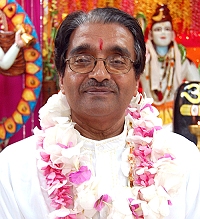From a satsang with Paramacharya of SWAHA, H.H. Pt. Hardeo Persad
On December 22, 2023, we mark the auspicious occasion of Gita Jayanti, a celebration woven into the fabric of Hindu spirituality. This observance pays homage to the anniversary of the composition of the profound Hindu scripture, Shrimad Bhagavad Gita, also known simply as the ‘Gita.’ Crafted by the venerable Sage Ved Vyaas over five millennia ago, this sacred text unfolded on Mokshadaa Ekaadasi, within the month of Maarghsheersh (November-December).
Translated as “The Divine Song of God”, Shrimad Bhagavad Gita stands as a sublime extract from the colossal epic, the Mahaabhaarat. Nestled within the Bhishma Parva of this grand narrative, the Gita unfolds a poignant conversation between Bhagavan Krishna and the noble Arjuna, transpiring on the battlefield of Kurukshetra at the precipice of the war between the Paandavas and the Kauravas.
As the armies of the Paandavas and Kauravas stood arrayed for battle, Arjuna, the valiant prince, found himself overcome with trepidation, hesitant to engage in the impending conflict. Bhagavan Krishna, his divine charioteer, bestowed upon him profound teachings, urging him to recognize his duty to defend his army and to rise to the call of battle. Sanjay, blessed with divine vision by Ved Vyaas, narrated this celestial dialogue between the Lord and Arjuna, giving birth to the eternal scripture we know as the Gita.
Penned in the classical language of Sanskrit, this divine discourse comprises 18 chapters and 700 verses, each a direct expression from the lips of Bhagavan Shree Krishna. The Gita unravels profound truths, delving into the paths of self-realisation, Bhakti (devotion), Karma (action) and Gyaan (knowledge) Yoga, offering a guide to navigating the intricacies of life.
Central to its teachings is the reiterated emphasis on the performance of one’s duty, encapsulated in the poignant words “Dharmakshetre kurukshetre” at the outset of the first chapter. Bhagavan Krishna later underscores that the individual who executes their actions without attachment attains the Supreme, emphasising the transformative power of duty-bound actions.
The Gita explores a myriad of subjects, including the nature of the soul, the classifications of sattvic (pious), rajasic (materialistic) and tamasic (inert) characteristics, the significance of selfless action, and devotion to both form and formless manifestations of the Divine. Within its verses lies a reservoir of timeless wisdom, offering seekers a pathway to unravel the mysteries of existence and gain a profound understanding of the omnipresent Divine.
On this sacred Gita Jayanti, let us consider the profound resolve to fortify our spiritual practices through the daily study of the Gita, echoing the sentiment expressed in Chapter 18, verse 70: “Whosoever studies this sacred dialogue of ours in the form of the Gita, by him too shall I be worshipped through wisdom-sacrifice; such is My mind.” May this eternal scripture continue to illuminate our hearts and minds, guiding us on the path of wisdom and devotion.



